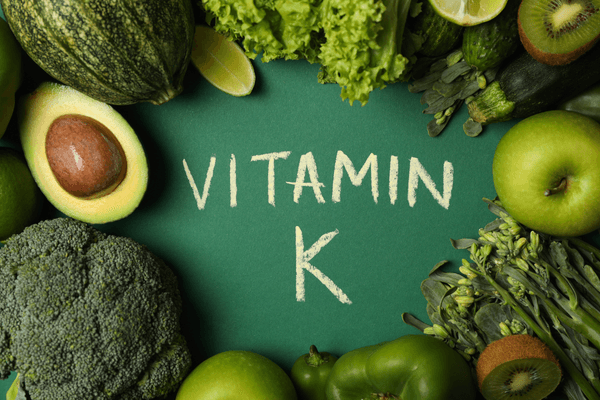Vitamin K is a fat soluble vitamin that is crucial for body function. Vitamin K comes in two forms – One is phylloquinone (vitamin K1) which is found in plant foods and other is menaquinone (vitamin K2) which is found in animal foods. Our body uses both forms of vitamins. Vitamin K2 is produced by some of the bacteria in the gut.
Vitamin K is a nutrient that is essential for our body to stay healthy. The daily requirement for women is 122 mcg and for men is 138 mcg. Normal blood coagulation (clotting) requires vitamin K. One medication that prevents the effects of vitamin K is called warfarin. This medication aids in preventing the formation of abnormal blood clots. It is used to treat illnesses including thrombophlebitis, or clots in inflamed veins in the legs, and pulmonary emboli, or blood clots in the lungs. It aids in preventing the formation of fresh blood clots. A warfarin overdose may result in unexpected bleeding.
Difference between K1 and K2
| Category | Vitamin K1 | Vitamin K2 |
| Chemical structure | Phytyl side chain | Phytyl side chain and isoprenoid side chains. |
| Sub types | Phylloquinone | Menaquinones (MKs) |
| Absorption | Absorption is less | Absorption is more, the body absorbs 10 times more vitamin K2 in the form of Menaquinone |
| Sources | Bacteria in the gut | Fermented foods, meat, and dairy products |
| Storage | Liver, heart and pancreas | Brain and Kidney. |
Why do people take vitamin K?
Decreased levels of Vitamin K can increase the risk of uncontrolled bleeding. Vitamin K deficiency is rare in adults, which is very common in newborn infants. A single Vitamin K injection is essential for a newborn. Vitamin K deficiency is not common, it may increase the risk of disease that affects absorption in the digestive tract such as Crohn’s disease.
Causes of vitamin K deficiency
In healthy adults, deficiencies in vitamin K are uncommon. The majority of adult vitamin K deficient individuals have a major health issue like digestive issues resulting in fat malabsorption, such as cystic fibrosis, a blocked bile duct, and the use of anticoagulants like warfarin etc.
Functions
- In addition to being a natural treatment for blood clotting, vitamin K provides many other health advantages such as reducing heart disease, enhancing bone and cognitive health, and decreasing vitamin K insufficiency symptoms. Vitamin K helps in the synthesis of several proteins required for blood clotting and bone growth.
- The two most important functions of vitamin K are wound healing and counteracting the negative effects of blood-thinning medications. It is also used to stop bleeding problems in infants who have hemorrhagic illness, which is brought on by a lack of vitamin K.
- An essential component of supporting bone health is vitamin K. It guarantees the calcium-binding action necessary for the proper operation of the gums and bones, along with the vitamin D. It lowers the risk of fracture in elderly women and strengthens the skeletal structure and bone density. Additionally, it effectively heals bone loss and osteoporosis.
- Numerous academic studies also find that vitamin K users have a lower incidence of peripheral artery disease. It promotes overall cardiac health by preventing mineralisation in the artery walls and controlling blood pressure, which enables the heart to circulate blood easily throughout the body.
- It has also been established that vitamin K plays a critical role in promoting dental health. It stimulates the synthesis of osteocalcin, the protein needed to start the formation of new dentin, the calcified tissue that lies beneath the layer of enamel on teeth. It also keeps teeth from falling out or decaying by strengthening them from the root up.
- It is used to avoid bleeding issues in cases of overdosage from coumarin poisoning, salicylates, sulphonamides, warfarin, and other antibiotics.
- In certain instances, vitamin K has also been shown to help older people’s memory and cognitive function.
- It is used to treat biliary cirrhosis-related itching and has also been shown to lower blood cholesterol in dialysis patients.
- Applying vitamin K topically is very important for getting rid of spider veins, stretch marks, bruises, and scars. It also actively aids in accelerating the skin’s healing process and addresses a variety of skin disorders, such as rosacea, acne, and redness.
Good sources of vitamin K include:
- Dark leafy greens
- Broccoli
- Cauliflower
- Kiwi
- Cheeses
- Avocado
- Soybean oil
- Egg
- Liver
- Duck
- Berries
- Sausages
- Asparagus
Interaction
Vitamin K effects can be disrupted by a variety of medications. These consist of blood thinners, aspirin, antacids, antibiotics, and medications for cancer, seizures, high cholesterol, and other diseases.
Signs of vitamin K deficiency
These are the most typical indicators of a deficit.
- Extended blood clotting time or an extended prothrombin time
- Bleeding
- haemorrhaging
- osteoporosis or osteopenia
- Small blood clots underneath their nails
- Stool that looks dark black
Conclusion
Vitamin K is available in two primary forms: K-1 and K-2. K-1 is the main source of vitamin K in the diet and is mostly found in leafy green vegetables. But K-2, especially the K-2 variant MK-7, is absorbed by the body more easily. Dairy products, fermented foods, and organ meat are good sources of vitamin K-2. Vitamin K-2 is particularly abundant in fermented soybeans. K-2 is also produced in trace amounts by gut bacteria in humans. For healthy bones and blood coagulation, vitamin K is necessary in both forms, vitamin K-2 may also offer protection against heart disease and some types of cancer. The majority of people get adequate vitamin K from their diet, and vitamin K deficiency is quite uncommon. If you have bleeding sores, scabs that won’t go away, or you bruise easily, you should consult a doctor. This could indicate a lack of vitamin K.
Nesha Felciya,
Clinical Dietitian, Simplyweight













